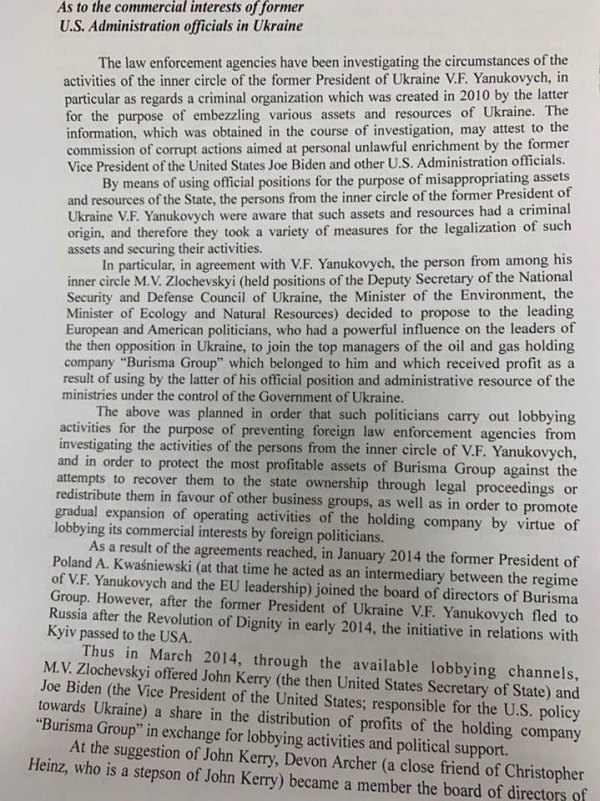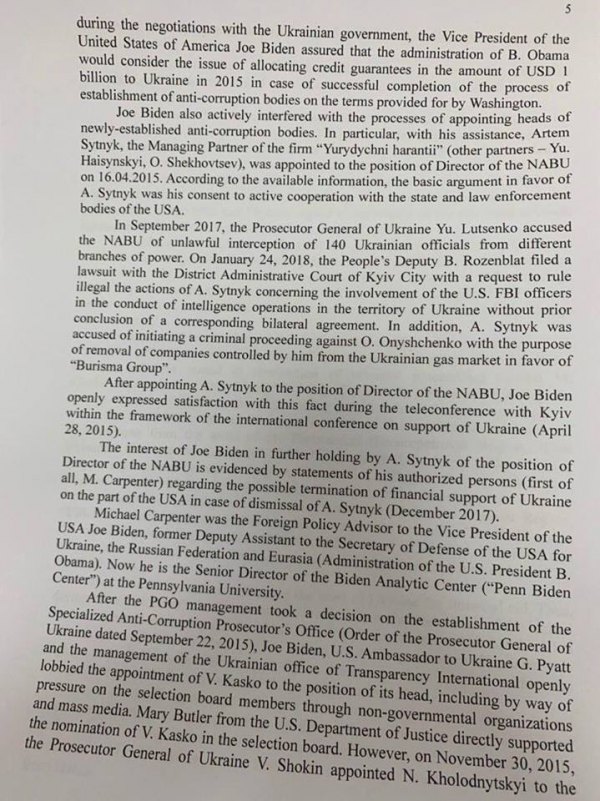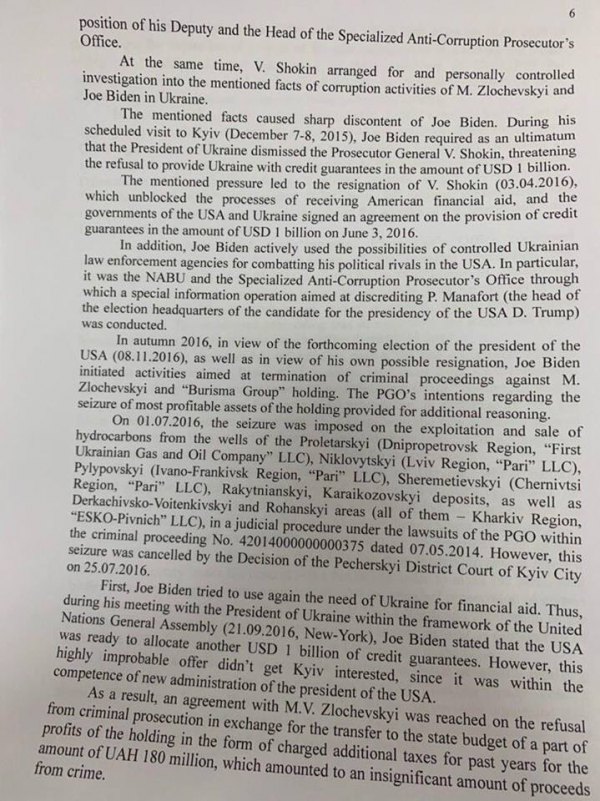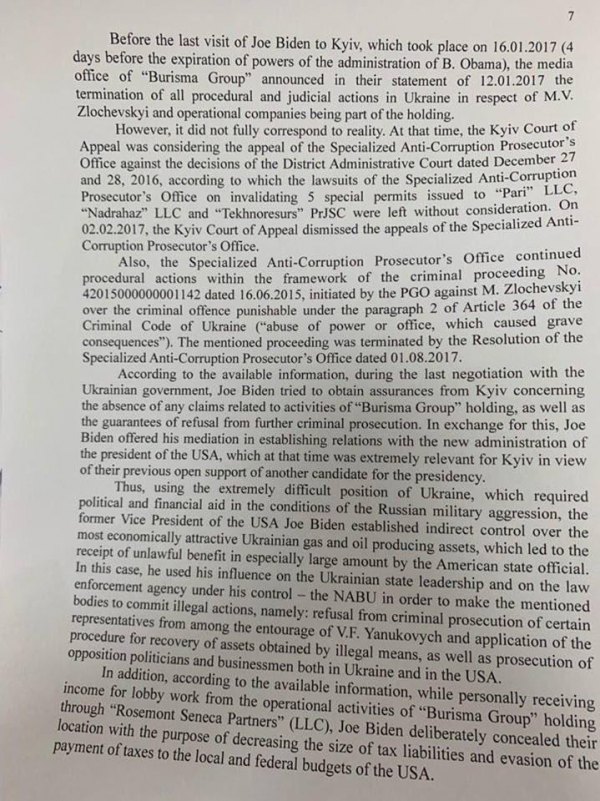A memo allegedly leaked from the Prosecutor General’s Office of Ukraine shows that prosecutors are accusing former U.S. Vice President Joe Biden of receiving “an unlawful benefit” from former Ukrainian Ecology Minister Mykola Zlochevsky’s Burisma Group, and oil and gas producer.
According to the document, Ukraine’s Prosecutor General’s Office also accuses Zlochevsky of offering Biden and former U.S. Secretary of State John Kerry a share of Burisma Group’s profits.
Michael Carpenter, the head of the Penn Biden Center for Diplomacy and Global Engagement, declined to comment. Zlochevsky’s lawyer Yaroslav Belyavsky and Burisma Group did not respond to a request for comment.
Kerry could not be reached for comment through the Carnegie Endowment for International Peace and the Kerry Initiative at Yale University, where he is currently working.
Lawmaker Sergii Leshchenko published the memo on May 14. He said that the memo had been submitted by Ukrainian Prosecutor General Yuriy Lutsenko’s team to U.S. President Donald Trump’s team and that he had received it from journalists working for a news site affiliated with Trump.
Lutsenko’s spokeswoman Larysa Sargan denied that the memo had been submitted from Lutsenko’s team to Trump’s team.
The leaked memo came in response to claims by Trump’s personal lawyer, former New York City mayor Rudy Giuliani, that Leshchenko had been convicted of interfering in the 2016 U.S. presidential election on the side of the Democratic Party, claims that Leshchenko denies.
And it also added another wrinkle to one of the strangest recent events in American and Ukrainian politics: Giuliani’s announcement that he would visit Ukraine to push for investigations into alleged Ukrainian interference and into Biden, Trump’s potential opponent in the 2020 presidential election.
Real memo?
The memo states that, in March 2014, “through the available lobbying channels, M.V. Zlochevsky offered John Kerry and Joe Biden a share in the distribution of profits of the holding company Burisma Group in exchange for lobbying activities and political support.”
The memo claims that, at the suggestion of Kerry, Devon Archer — a friend of the former Secretary of State’s stepson Christopher Heinz — became a member of Burisma’s board of directors.
“Biden established indirect control over the most economically attractive Ukrainian gas and oil producing assets, which led to the receipt of unlawful benefits in especially large amounts by the American state official,” the leaked memo reads. “In this case, he used his influence on the Ukrainian state leadership and on the law enforcement agency under his control – the NABU (the National Anti-Corruption Bureau of Ukraine) – in order to make the above-mentioned bodies commit illegal actions.”
The memo also claims that Biden prevented Ukrainian law enforcement agencies from prosecuting allies of ex-President Viktor Yanukovych and opposition politicians and businesspeople. The memo did not specify who they were.
It goes on to claim that, “while personally receiving income for lobbying from the operational activities of Burisma Group through Rosemont Seneca Partners, Biden deliberately concealed their location” to avoid paying local and federal taxes.
Leshchenko cast doubt on the veracity of the claims about Biden and Kerry. He said he believed the memo to be part of what he alleged was a disinformation campaign by Lutsenko.
“Lutsenko seeks to use Ukraine as a bargaining chip in the battle between the Democrats and the Republicans in the U.S.,” Leshchenko said. “They have created a conspiracy theory that made us hostages to one person’s desire to keep his job. (Lutsenko) should not get Ukraine involved in this terrible scenario and should not take President-elect Volodymyr Zelenskiy hostage.”
Lutsenko has been accused of trying to curry favor with Trump by investigating Biden, Trump’s potential Democratic rival in the 2020 presidential election.
In a March interview with The Hill news site, Lutsenko claimed Biden had pressured Ukraine to sack then Prosecutor General Viktor Shokin in order to halt an investigation into Burisma, where the then vice president’s son, Hunter Biden, sat on the board of directors.
“I have had no role whatsoever in relation to any investigation of Burisma, or any of its officers,” Hunter Biden said on May 1. “I explicitly limited my role to focus on corporate governance best practices to facilitate Burisma’s desire to expand globally.”
Joe Biden denied on May 13 that Hunter Biden had asked him for a favor in Ukraine while serving on Burisma’s board.
“We never once discussed it when he was there,” Biden told the Associated Press. “There’s not a single bit of evidence that’s been shown in any reporting that’s been done that he ever talked about it with me or asked any government official for a favor.”
Zlochevsky has been investigated over alleged money laundering, the issuance of subsoil exploration licenses to his own companies and tax evasion. Zlochevsky has previously denied the accusations of wrongdoing.
As part of the case involving Zlochevsky and tycoon Serhiy Kurchenko, prosecutor Kostyantyn Kulik brought charges against several allies of President Poroshenko in March. However, Lutsenko has refused to authorize the charges for the Poroshenko allies and liquidated the units that issued them.
Court battle
Leshchenko first revealed the memo’s existence on May 13 during a briefing outside the Kyiv Administrative Court of Appeals.
That day, the court was scheduled to consider his appeal against a previous ruling by a lower court. However, that session was postponed because one of the judges hearing the case had been appointed to the Supreme Court.
In December 2018, The Kyiv Administrative District Court upheld Petro Poroshenko Bloc lawmaker Boryslav Rozenblat’s lawsuit against Leshchenko and Artem Sytnyk, the head of the National Anti-Corruption Bureau of Ukraine.
The court ruled that Leshchenko and Sytnyk had illegally interfered in Ukraine’s foreign policy when they revealed that Trump campaign manager Paul Manafort’s surname and signature had been found in the so-called “black ledger” of Yanukovych’s Party of Regions. The court also stated that Leshchenko’s actions had caused “interference” in American electoral processes and harmed the Ukrainian state’s interests.
The “black ledger” is alleged to show suspicious payments by the Party of Regions to a range of individuals and officials. It became a key document implicating Manafort in corruption in Ukraine, and helped to end his tenure as Trump’s campaign chair in August 2016.
Leshchenko argued that the court ruling was unlawful and part of an attempt by President Petro Poroshenko and Lutsenko to curry favor with Trump.
He also said that Rozenblat had no right to file the lawsuit because his interests had not been affected and because, according to the Supreme Court, administrative courts cannot consider lawsuits against Verkhovna Rada members. Leshchenko added that the statute of limitations for the lawsuit had expired.
Rozenblat denied the accusations of wrongdoing, in turn accusing Leshchenko of unlawful interference in the 2016 U.S. presidential election on behalf of Trump’s rival, Hillary Clinton.
Lutsenko responded to Leshchenko’s comments on May 14 by calling him a “skunk” and saying that he would be questioned and charged with unlawfully revealing the details of the Manafort investigation. The comments raised eyebrows since prosecutors cannot charge Leshchenko without stripping him of parliamentary immunity.
Leshchenko in turn responded by urging Lutsenko to strip him of immunity and added that Lutsenko himself had revealed investigative secrets and should be investigated over that.
Giuliani’s visit
The December administrative court ruling has placed Leshchenko front and center in a narrative popular among Trump supporters that Ukraine interfered in the 2016 election against Trump.
The “Ukrainian collusion” narrative has gained popularity in the U.S. conservative press and has even been endorsed to varying degrees by Trump himself and his inner circle.
That narrative took center stage in both the U.S. and Ukraine earlier this month when Giuliani told the New York Times he planned to visit Ukraine to meet with President-elect Volodymyr Zelenskiy and advance several investigations beneficial to Trump.
Then, on May 9, during a live interview on the Fox News, Giuliani backtracked, announcing he would cancel the trip because of “people that are enemies of the president, in some cases enemies of the United States and, in one case, an already convicted person who has been found to be involved in assisting the Democrats with the 2016 election.”
The “convicted person” was Leshchenko, he stated.
In response, Leshchenko claimed that Lutsenko had deliberately deceived Giuliani, since the administrative court ruling against him was not a “conviction.”




